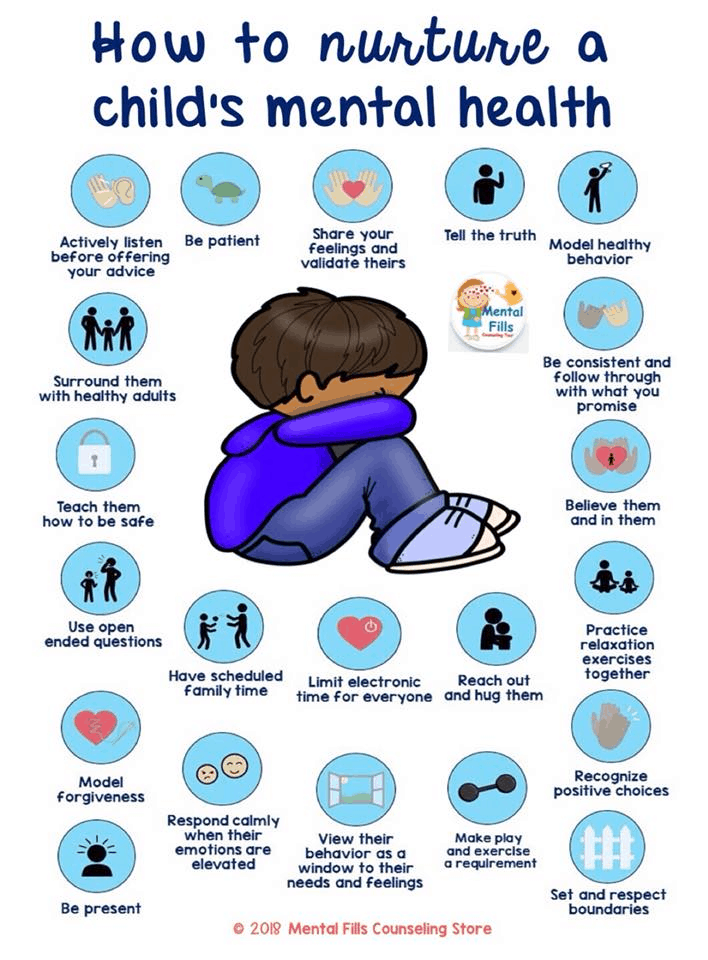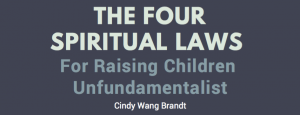
5 Ways Fundamentalism Hinders Emotional Literacy
May 29, 2018
Photo cred: https://www.teacherspayteachers.com/Product/Child-and-Teen-Mental-Health-Caregiver-Poster-3735855
“How do you feel?” I ask my son before heading to the dentist.
“I’m a little nervous.”
“About what?”
“I’m worried the shot will hurt and also this is a new experience for me and I don’t know what to expect.”
“What are some thoughts that might help you?”
“It is very likely the shot will not hurt very much and even if it does, it will be over pretty quick.”
This is an exercise from the cognitive behavioral therapy that we both have learned to help cope with anxiety-ridden situations in everyday life. In theory, as the parent, I would help guide and come up with attitudes and actions that will help combat escalating anxiety, but as you can see from the dialogue above, my 12 year old needed no help from me to create solutions for his own mind.
This is going to start sounding like parental #humblebrag, but I am super impressed with my son’s level of emotional literacy, not just because I am 100% unbiased in my opinions of his awesomeness, but also because the fundamentalism in which I grew up in could have never afforded me the freedom to explore, own, and manage my emotions with this level of dexterity. Here are five reasons why:
One. As human beings, we experience a large range of normal emotions, from happiness to anger to glee to worry to excitement to grief. But fundamentalism demanded from us godliness, which in its most toxic version turned us into Uni-kitties who expresses joy and rainbows and unicorns and suppresses any negative emotion. Anger was sinful, full stop. Disappointment led to platitudes about how God had a better plan. Grief was met with the shallow hope that everything will be okay (which nobody could be sure of), so you can be sad, but not all the way sad. As a result, we didn’t get to acknowledge negative feelings or practice managing them.
Two. In fundamentalism, mental health is conflated with spiritual health. This actually does injustice to both our emotions and our spirituality. There are horror stories of children in fundamentalist environments who were shamed for experiencing depression, anxiety, and other mood disorders, and counseled to pray for healing instead of seeking mental health professionals. I think spiritual health is crucial and affects our mental health because we are holistic persons, but the tools we use for maximizing wholeness come from two separate areas of expertise. For spiritual wounded-ness, we can reach for prayer and meditative practices as well as better theology. For brain chemistry dysfunction leading to mental instability, often what people need are medication or professional therapy—not a pastor with an MDiv degree.
Three. Authoritarian styles of parenting diminishes emotions. Fundamentalists justify harsh forms of punishment with Scripture or religious authority, and it has been shown that corporal punishment or other harsh disciplinary measures, like yelling, drives a child into a fight or flight response. Their brains are altered for pain desensitization leading to a decreased ability to literally feel.
Four. The fundamentalism in which I was raised taught a very disembodied spirituality. Popular theology states that our spirit which lives on into eternity is all that matters; our bodies are wasting away. “The flesh,” is contrasted with the spirit and is the sinful part of who we are so our bodies are quite capable of leading us into sin. (Of course, this seemed to mostly apply to young women giving enthusiastic consent for sex, but that’s another discussion.) Our emotions cause physical symptoms. Our hearts literally race when we feel panic rising, our skin tingles when we are in love, and we feel physical pain when we are in emotional distress. In teaching us to ignore our bodies, by corollary we also miss out on paying attention to our feelings–identifying them and learning how they work in conjunction with our whole selves.
Five. Community is vital to our flourishing, but in fundamentalism, community often turned into an unhealthy enmeshment of relationships in which people violated personal boundaries in the name of “accountability.” Love very often looked more like control, where social ostracization tactics, empty platitudes, and shaming gossip, are used by the group to punish individuals for straying from the prescribed life. The result is a cult-like atmosphere where individuals were afraid to get in touch with their own intuition and felt like they must always ask for permission to feel what they’re supposed to feel. Without healthy boundaries, we did not learn to take responsibility for our own feelings nor allow others to feel their feelings.
I do not completely fault my own fundamentalist upbringing because during my childhood, there was less information about mental health that we have access to today. However, now that we do know, we must do better by the next generation. We now understand the importance of mindfulness, emotional literacy, and caring for our mental health.
Emotional literacy, much like regular old literacy, isn’t learned overnight. We start with the alphabet and work our way into phrases, sentences, and beautiful, life-giving essays. So it is, we have to start young and help our babies/toddlers name how they feel, validate their emotions, and model how best to express and manage them. When emotional mastery becomes as intuitive as the ABCs, they can grow into adults who are using their skills to create the masterpiece of their lives.
Sign up for my parenting newsletter and get the four alternative spiritual laws:
http://eepurl.com/cMmHmD
Join us at Raising Children Unfundamentalist Facebook Group
Follow Parenting Forward
